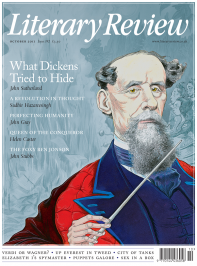John Gray
Made in Heaven
Humanity 2.0: What it Means to be Human Past, Present and Future
By Steve Fuller
Palgrave Macmillan 288pp £60 hbk/£19.99 pbk
It’s curious how often a militant commitment to humanity goes with a deep dislike for the human animal. Joseph Conrad wrote that while H G Wells wanted to improve human beings but didn’t care for them, he himself had no hopes for human beings but loved them all the same. Whether Conrad was really so fond of humanity may be doubted, but he had a point: humanism – at least of the modern secular variety – is very often a species of misanthropy. The animus of humanists against religion is telling, for if anything is quintessentially human it is the religious impulse: every culture is, in some degree, animated by it, while no other animal displays anything remotely similar. To despise religion is to despise humanity, so it cannot be the real human animal to which secular humanists are devoted. The object of their piety can only be some kind of ideal creature, a figment of the imagination that has never existed (and fortunately never will).
Interestingly, the misanthropic logic of humanism has been accepted by some of humanism’s more radical exponents. The contemporary cult of transhumanism is an arresting example. Viewing humans as the apex of evolutionary development, transhumanists are in no doubt that we are the most valuable species to date. Equally,

Sign Up to our newsletter
Receive free articles, highlights from the archive, news, details of prizes, and much more.@Lit_Review
Follow Literary Review on Twitter
Twitter Feed
It wasn’t until 1825 that Pepys’s diary became available for the first time. How it was eventually decrypted and published is a story of subterfuge and duplicity.
Kate Loveman tells the tale.
Kate Loveman - Publishing Pepys
Kate Loveman: Publishing Pepys
literaryreview.co.uk
Arthur Christopher Benson was a pillar of the Edwardian establishment. He was supremely well connected. As his newly published diaries reveal, he was also riotously indiscreet.
Piers Brendon compares Benson’s journals to others from the 20th century.
Piers Brendon - Land of Dopes & Tories
Piers Brendon: Land of Dopes & Tories - The Benson Diaries: Selections from the Diary of Arthur Christopher Benson by Eamon Duffy & Ronald Hyam (edd)
literaryreview.co.uk
Of the siblings Gwen and Augustus John, it is Augustus who has commanded most attention from collectors and connoisseurs.
Was he really the finer artist, asks Tanya Harrod, or is it time Gwen emerged from her brother’s shadow?
Tanya Harrod - Cut from the Same Canvas
Tanya Harrod: Cut from the Same Canvas - Artists, Siblings, Visionaries: The Lives and Loves of Gwen and Augustus John by Judith Mackrell
literaryreview.co.uk